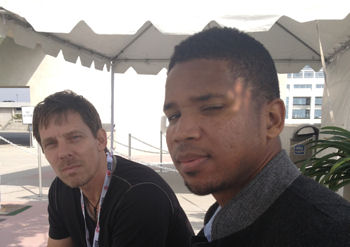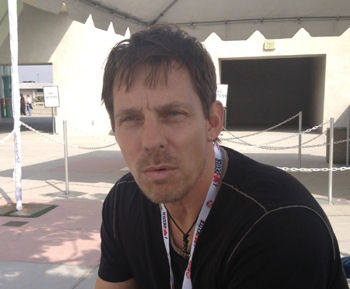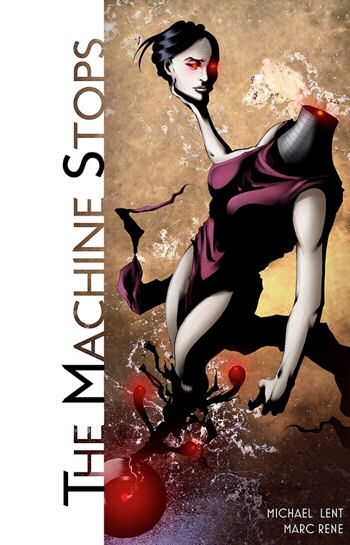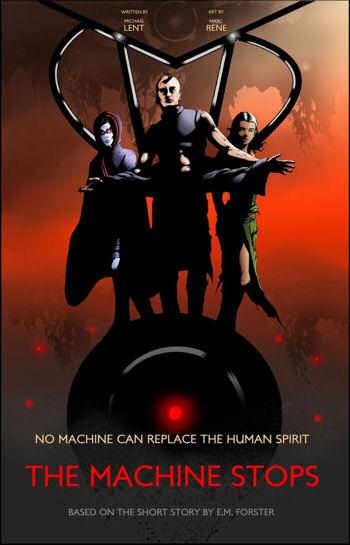|
Starting The Machine:
An Interview With Michael Lent And Marc Rene
|
|
|
A moment in the sun...under an umbrella...at SDCC 2013...
|
About a year ago, artist Marc Rene and I crossed paths at Illusive Comics & Games. A long-time concept artist with a style reminding me of Jae Lee, Marc had released several cool prints of various characters, and was sitting at a table doing beautiful sketches by request.
Then the next time we met, he showed me a hard copy of a book he had drawn, The Machine Stops #1. Based on the one science fiction short story by noted author E.M. Forster, and adapted by writer Michael Lent, the book was at the time self-published in a limited edition, looking for larger distribution.
At Comic-Con this past summer, I ran into Marc, found Michael, and then dragged them both to a quiet place outside the Convention Center. Do you know how hard that is? Harder than altering a dystopian society in which people are discouraged from making personal contact with one another.
I'd held off on running this interview until such a time as now: The Machine Stops does indeed have wider distribution, and the first issue makes its digital debut this week from Alterna Comics.
You can purchase The Machine Stops #1 from Alterna Comics here.
|
|
|
Michael Lent:
"...this alienation that comes from getting your information that way..."
|
Derek
McCaw: I had no idea E.M. Forster had a sci fi story. Michael, what drew you to it as a writer?
Michael Lent: I read it when I was in college. It's a stand-alone, the only sci-fi that he did. He wrote it in 1909. And it prophesizes social media, and the reliance on not even second hand experience but tenth hand experience over primary experience. It's just this alienation that comes from getting your information that way.
I thought it was a really cool story, but as you said, it's kind of obscure. But I had a chance to revisit it about a year and a half ago, and I was blown away. I do all kinds of writing, and initially I wanted to do it as an audio theater piece. So I wrote a script, but I kept thinking in the back of my mind that it's so visual. It's only a small slip of a short story, but I thought that there was so much more in terms of bringing it forward a hundred years or so.
Derek McCaw: Yes, I wanted to ask you after reading the first issue -- how much of this was in the story originally, and how much was alteration and modifying by you? In the years since, people have come up with similar things. There's a bit of a Matrix feel, but I suspect that The Matrix borrowed something from this -- I wouldn't be surprised if the Wachowskis had read this story as well.
Michael Lent: Definitely. One of the things that The Matrix borrowed, intentionally or unintentionally, was the beehive colony where people were sleeping the entire time. That's right out of "The Machine Stops." The first couple of sentences are "Imagine a pod within this vast colony. It's octagonal in shape."
|
|
|
The cover for Issue #1, now available at Comixology...
|
The first thing I thought when I read this was "whoah, like Matrix. Where are we?"
Marc Rene: The people are pale like a fungus...
Michael Lent: Just like how they are in The Matrix. There's a lot of overlap, but Forster definitely paved the way.
Derek McCaw: How much work did you have to do as a writer to change all that up?
Michael Lent: We had to recreate the technological landscape. That was the big work. Any sort of thing -- in 1909, everything was sort of tubes and servos and that sort of thing. We didn't want to call attention to itself, and I don't think that it does, but we had to have practical solutions for how you could live in essentially like a petri dish, which is what they do. But you'll see that we actually have some science behind that.
As far as the big ideas of the story, those come from Forster. Most people know him from Room With A View, A Passage To India...
Derek McCaw: He's seen in terms of costume dramas, which isn't what he was writing. It was just writing in the time period...
Michael Lent: The technology and the big ideas are cool, but if you don't have the characters... both Marc and I responded very strongly. It's a relationship between a mother and her estranged son. How they get back together...
Derek McCaw: And if I'm reading correctly, they never actually touched...
Michael Lent: Exactly. From birth they were separated. So we have a page with this silent birth, and she has this mother's longing, and he's taken away.
Derek McCaw: There's so much dystopian fiction from that time that a lot of us today don't explore. A lot is lost, though Alan Moore probably knows it all. Do scholars know what E.M. Forster was thinking? What was influencing him in 1909 to come up with this?
|
|
|
A promo piece by Marc Rene...
|
Michael Lent: Well, they were Victorians. There wasn't a lot of touching and emotion there. We've sort of in a hundred years come full circle, for a different reason. Marc and I talked, we've had a lot of extensive conversations about this, but things like, it's really hard for guys to get out and go dating anymore, because it's so much easier to just date on your laptop, so to speak.
Derek McCaw: USA Today had a headline this morning about that very thing, how social media had changed everything.
Michael Lent: Right. You don't have to buy somebody dinner, and pick them up and take a shower and dress nicely.
Derek McCaw: Marc, who are your visual influences?
Marc Rene: Right off the top, JH Williams III is the cream of the crop when I think of my big impact influences. My foundational influences are from Neal Adams, he's had a heavy hand in the development of my artistic view in general.
But in addition to JH, I like Jae Lee's work a lot...
Derek McCaw: Your work reminds me a LOT of Jae Lee...
Marc Rene: In issue #1, I really wanted to set a mood of underlying dread to the entire thing. It's a lot of dialogue between the mother and son. And I always look at "what more, what more?"
So I went back to stuff like The Dark Tower and Promethea, where JH Williams really uses the panel layout to drive the story. And I said "a-HA! This is where I tell a narrative alongside the dialogue that will help push the story along."
So in terms of influences that are apparent, I would say those two.
Derek McCaw: Well, I liked the book, and I really hope people find it. Thank you so much for sitting down with me.
|









